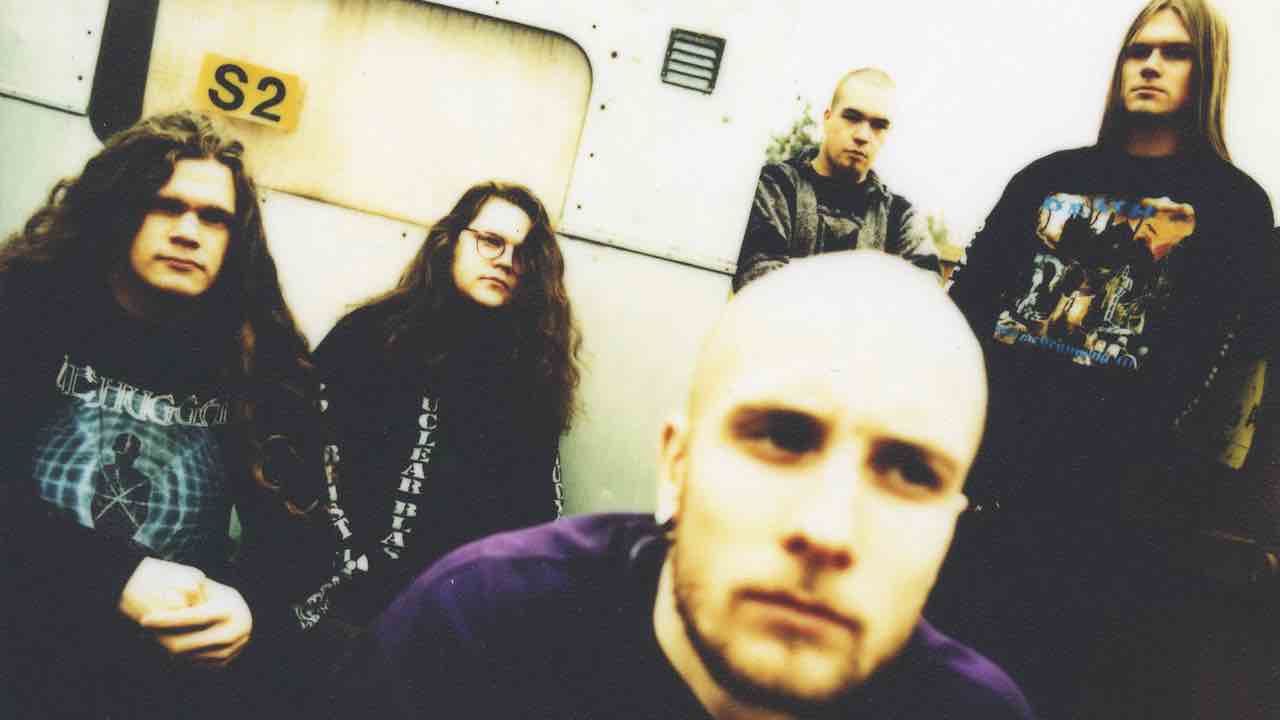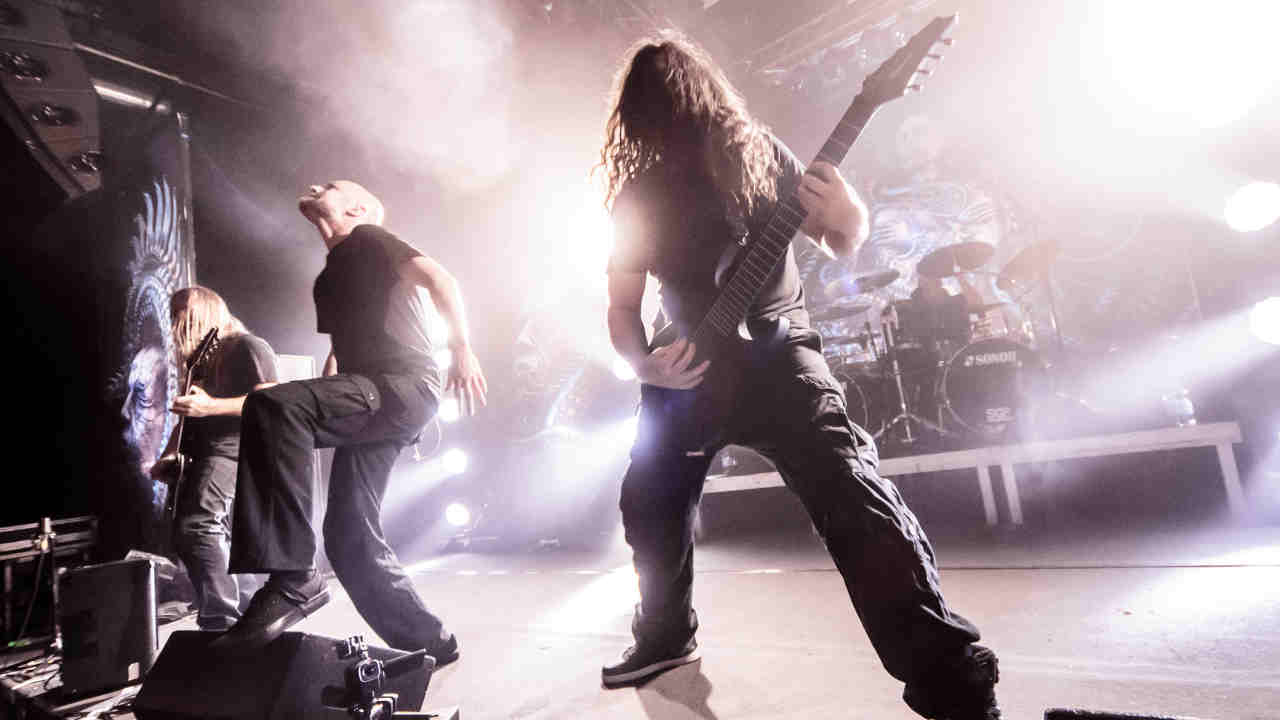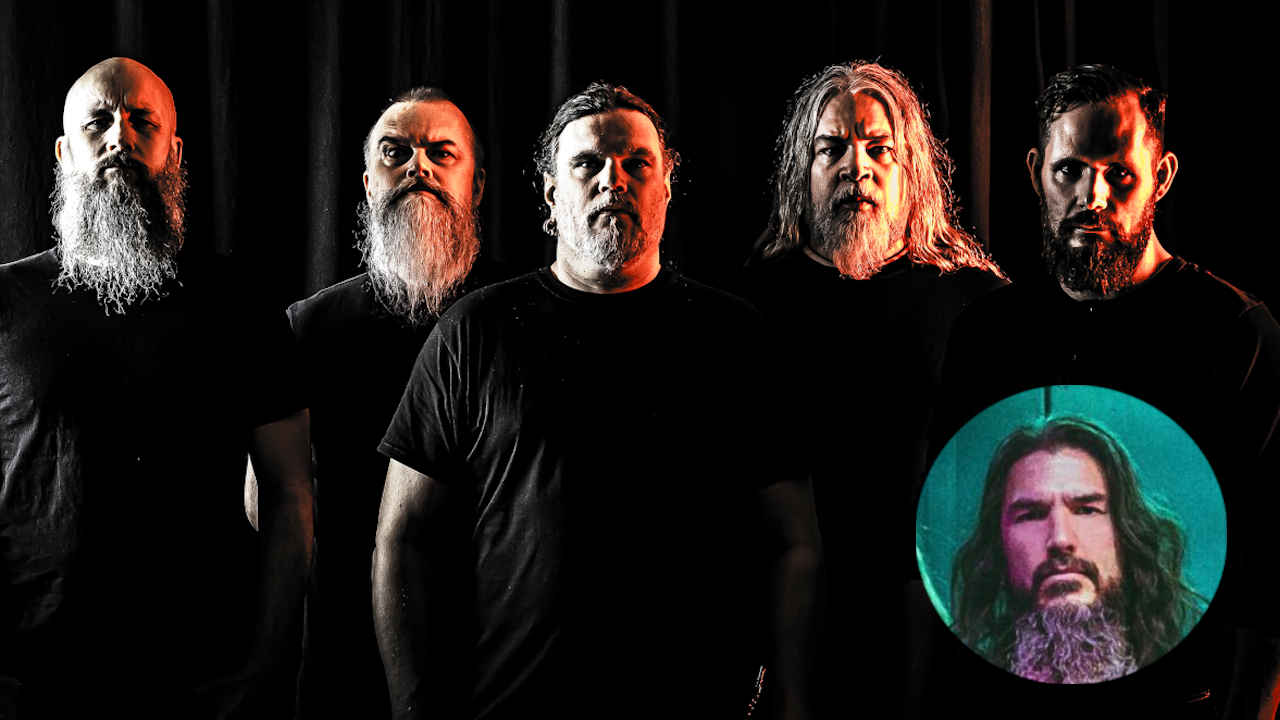As the frontman of Machine Head, Robb Flynn is no stranger to a riff or two, but even he was stunned by the unrelenting attack of their 1994 EP, None, and took them on the road in Europe. As he sits down for a chat with Meshuggah axeman Mårten Hagström, on the eve of the release of the Swedish band’s 11th album, Immutable, the camaraderie and mutual respect between the two is undeniable. And while Mårten excitingly reveals he has enough leftover material from Immutable’s writing sessions for “three different albums”, it’s the band’s journey we’re interested in today. From Mårten meeting drummer Tomas Haake at school, to their detour into carpentry, to picking up an eight-string guitar, it’s been an extraordinary evolution.

Robb: “You’ve known Tomas since you were six or seven years old, is that true?”
Mårten: “That’s true. We grew up in the same neighbourhood [in Örnsköldsvik]. We went to the same kindergarten at six, and then we just got stuck. First, we were just friends; everyone at that age is your friend or worst enemy, and he happened to be on the good side of me! Ha ha! At about 12 years of age we found out that we had a mutual interest, we liked music, and I already had a guitar that my mum got off a relative that I started to mess around with, and Tomas was drawn to the drums. So yeah, we went to school together.”
Robb: “But you weren’t really friends in school, or were you?”
Mårten: “Oh, we were best of friends. We went to school together, started playing music together, and we took a sabbatical for a year at the same time, took carpentry together. Then we had this band, this instrumental, Rush-inspired, thrash metal, weird stuff going on.”
Robb: “Take me back to the very first jams that you guys were doin’ when you first start playin’ guitar. What songs are you guys jammin’ on? ’Cos you’re not playin’ Rush at 12! Ha ha!”
Mårten: “No, we weren’t. The simplest New Wave Of British Heavy Metal, like Breaking The Law, Judas Priest, old Metallica – Kill ’Em All was just coming out. The government-subsidised radio had this show, and they played everything from UFO, Led Zeppelin, up to what was coming out now. And we didn’t know it growing up, but it really exposed a lot of kids in Sweden to sitting around your radio, recording that show, waiting for the gems to show up. Back then when you’re 12, 13, not having the internet, that was a treasure trove. But something that was weird was that we started writing stuff pretty much straight away. Granted they weren’t really songs, and it’d be totally unlistenable to anybody today, but we tried. So, by the time we rehearsed our first four or five cover tracks, we had one song of our own when we were 13.”
Robb: “What was the name of that song? Do you remember?”
Mårten: “I think something weird, like Acid Rain.”
Robb: “Was it like a New Wave Of British Heavy Metal- type song?”
Mårten: “Yeah, but it was so rudimentary. I remember the first couple of rehearsals that we had, we were doing it where Tomas’s parents had this big oil tank for the heater in the basement. It was rarely full, so when he felt we were really getting into some heavy stuff, he would bang at the back with his stick, and you were deaf! It was so fucking cool, but his parents didn’t enjoy it, I’ll tell you that.”

Robb: “So, you take a break, you go to a carpentry school, and then you go, ‘Hey, maybe this isn’t for me, I’m gonna get back into music with Tomas.’”
Mårten: “Yeah, basically. Me and Tomas had this weird band, called Barophobia. It’s fear of losing gravity. We wanted to be heavy and experimental, and the two guys that were playing with us were good musicians, but they wanted to be more like the band Extreme – to have more of a chick-appeal. Anyway, we felt we weren’t really a band anymore, and they wanted to go for their own thing. We had actually played a couple of shows with Meshuggah at the rec centre when we were about 16. They had just lost their drummer, and had a couple of labels they were in touch with. They contacted Tomas and were like, ‘You’re a really good drummer and we like your band, but we don’t have a drummer and we hear you might not have a real band going right now. How about joining up?’ So, he called me and asked me.”
Robb: “Who called him to say all that?”
Mårten: “I think it was Jens [Kidman, Meshuggah vocalist], but I’m not sure. I actually think the contact was made in a music store in Umeå when Tomas was up there buying stuff that he couldn’t find here. But he was like, ‘Dude, I really don’t want to leave you high and dry, but we don’t have a band and I want to play, and these guys want me. What do you think I should do?’ And I was like, ‘Fuck it man, go for it, they’re an awesome band.’ We liked the style; we had those thrash roots and the New Wave Of British Heavy Metal in common. So he moved up to Umeå and started playing, and I just quit and started working at the school. I was like a mentor for people who were starting to lose focus. I worked a year and a half doing that. I sold everything apart from one guitar, ’cos it was painful. I was still young, I was 20, but me and Tomas had played since we were small kids, and everything was centred around discussing music.”
Robb: “And you kind of lost your friend of 14 years, in a way. Not that you weren’t friends, but now…”
Mårten: “Exactly, we lost the common goal, the common purpose. I actually rehearsed with two guys who were like, ‘You can’t quit Barophobia, we need to rehearse these songs.’ I didn’t feel like it, but I was still playing somewhat. Then Meshuggah released Contradictions Collapse, the first album on Nuclear Blast, in 1991. A year after that, Tomas called me up and he was like, ‘Dude, do you play at all? Jens feels like maybe he doesn’t want to play guitar and just [wants to] focus on the vocals.’ And back then, Meshuggah was a two- singer band, ’cos half the vocals were Fredrik’s [Thordendal] and half were Jens’, so Fredrik didn’t want to sing anymore.”
Robb: “And Jens played guitar?”
Mårten: “Exactly, so both played guitar and both did vocals. So they needed a guitar player, they started looking for people, and they had a couple of guys come up from Stockholm who had this audition, and I think it didn’t turn out that well. So, I started going up there, rehearsed a couple of times, and it was like, ‘OK, here we go.’ So from late ’92, early ’93 is when I officially joined the band.”
Robb: “So, about the time of the None EP?”
Mårten: “Yeah. So when I started, we were kind of in writing mode for what would turn out to be [1995’s] Destroy Erase Improve, but the label wanted us to put something out more immediately. So, some of the stuff on None is actually some old Barophobia stuff that we incorporated.”
Robb: “Oh, OK, so what songs are yours?”
Mårten: “So, Aztec Two-Step, the last one, the weird one, is just all of us going nuts in the studio. Humiliative is a track we all wrote rehearsing, so some parts there are just from me, but the one track that’s really Barophobia music is Sickening.”

Robb: “When I signed to Roadrunner, Monte [Conner, former A&R] sent me a huge package of CDs from all over the world. There was death metal bands, thrash metal bands, and you guys, the None EP. I remember being fucking blown away, dude. The guitar tone ripped my face off. I was like, ‘Holy shit, this is fucking sick!’ Then Burn My Eyes comes out [in 1994] and we got to do the headline tour. Ian Sales was our booking agent, and we’d just done the Slayer tour, and he was like, ‘Who do you wanna take on the road? ’Cos I want my band Mary Beats Jane to go out with you guys.’ He sent me the CD and I was like, ‘It’s cool, it’s kind of like funk rock, and we [also] need something heavy: fuckin’ Meshuggah!”’
Mårten: “That’s awesome. With Destroy Erase Improve, Nuclear Blast were like, ‘You guys need to tour’, and we did this one tour, the Nuclear Blast Festival tour, where it was us, Amorphis, Dismember, Hypocrisy and Benediction, and that was the first international tour that we did, but it felt staged. It was a typical label touring festival thing going through Switzerland, Austria and Germany. But when you guys took us out on the road, that was a different feel. The venues were bigger, and you’d come off a really long tour cycle with Slayer. And we did it for nine weeks. I think that tour broke us in.”
Robb: “I have a lot of great memories, and one of the biggest is when we were playing in Germany and I was gonna do a ‘Pete Townshend’ – you know where you whip your hand around a bunch of times? Pete has a Les Paul with rounded edges, and I’ve got an Explorer with a spiky end that sticks up. And I go to do it, and I go, ‘Bam!’, and I must have pinched a nerve or something, but my hand literally froze. By the end of the night, I was like, ‘We have a show tomorrow and there’s no way I’m gonna be able to play guitar. Let’s ask Mårten.’ You were like, ‘Yeah, sure, no problem.’ And I was like, ‘I’ll show you how to play the songs on the guitar in the back of the bus.’ So you and I just sat there drinking an enormous amount of vodka, and you were—”
Mårten: “Yeah, real smart when you’re trying to learn shit!”
Robb: “I don’t smoke weed, but everyone else is smokin’ a shit ton of weed getting you high as fuck, we’re getting annihilated on the back of the bus, and then you spent the night on the bus.”
Mårten: “The day after, when I was trying to pull that off, I was like, ‘This is not gonna work.’ We went up, played our songs, went off, and everybody else started drinking. I was like, ‘Damn, I’m going up again.’ It was a mind-fuck. I think we played five songs with Meshuggah, and I was playing five or six with you, so basically the same amount of songs again.”
Robb: “What do you remember about the UK shows?”
Mårten: “I remember them being a big deal, ’cos you guys were doing good everywhere, but when we came to the UK it was like stepping up a notch. We were doing Brixton Academy and it was one of the biggest attendances we’d played that wasn’t a festival. I remember all of those shows, Manchester, Glasgow. I remember, ‘These shows are fucking violent, the crowd is violent.’ First of all, everything suddenly felt bigger. Second, our bassist went home before we hit England. Peter [Nordin, then-bassist] got sick, so me and Fredrik took turns playing bass. I played bass on my songs, he played bass on his songs, and we had to rearrange the entire way of approaching the show. There was a lot of weird stuff going on.”
Robb: “[You played the United States with] Sick Of It All and Slayer, right?”
Mårten: “It was a big deal for us, and that really turned us on for touring in the US. The pros and cons compared to Europe, and having better buses, things that came with the territory that we really enjoyed. Apart from being appreciated, that was a big deal for us. But then we got lucky, ’cos this was in ’99. We came home and did the Nothing album and discovered the eight-string thing, and started working on that. And then we just launched into three weeks with Tool, and then we finished up the album. Then we did the Ozzfest [in 2002], 10-and-a-half weeks, and then we were home for a week, and then Tool for nine weeks again, so that was a run.”
Robb: “How did you write that all-time fuckin’ champion beast riff in Bleed, off of the [2008] obZen album?”
Mårten: “Well, that’s a question for Fredrik, that’s his track, but I can answer it. I know how it came about. He had this idea to use this standard metal triplet – I mean, it’s been used over and over since ’86 in one way or another – but he had this idea of, ‘You could do something else with this, something that would put it in a light where you would recognise what it’s about and what it sounds like, the output of it, but mess around with it to turn it into more of a journey of itself.’ I know that he had an hour’s worth of different types of triplet parts, and he had to cook it down into something that was more manageable, and that turned into Bleed. Maybe if you look at it from ‘not having to kill your darlings’, it would be 14, 15 minutes, ’cos there’s a lot of cool shit he had to leave out. In order for it to be a song that would make sense, he had to narrow it down, and it turned into a song that’s almost eight minutes, so it’s not like it’s short.”
Robb: “It’s a fuckin’ badass song, man.”
Mårten: “Yeah, it’s cool. I hate playing it, but it’s a cool song. That song is kind of our hit.”
Robb: “Alright, last question. Tell us the details about your awesome new album, Immutable.”
Mårten: “It’s 13 tracks, 66 or 67 minutes of music, which is the longest album we’ve put out so far. We started writing, I was like, ‘Let’s try and make a Reign In Blood album, short but sweet, keep it just over half an hour, ’cos albums aren’t what they used to be anyways, it’s singles.’ But we went the opposite direction. We’ve been working our asses off for almost three years, and we’re really happy with the result. It’s a lot of music and by far the most dynamic we’ve been on an album, and I look forward to seeing how it comes across.”
Robb: “Well, it’s been a pleasure. Thanks, man.”
Published in Metal Hammer #360
